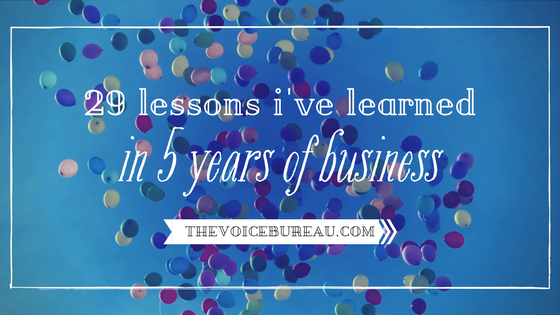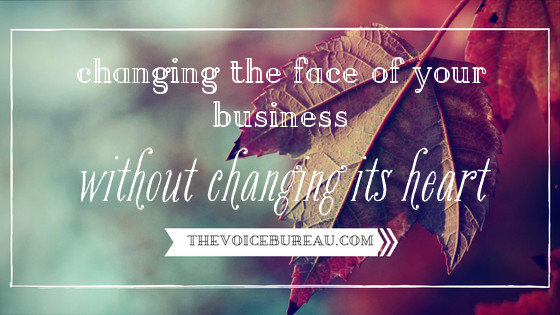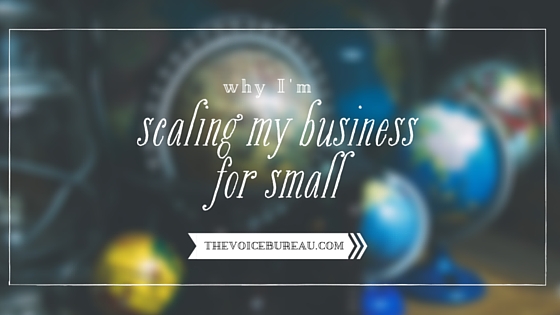Five years ago this week, I incorporated as an LLC.
*cue the confetti*
When I first dipped my toes into the world of creative self-employment, I didn’t have any expectations. All I knew at the time was that the traditional job market wasn’t working for me (or, at least, I wasn’t finding work in it). As a classic car magazine editor with literally no interest whatsoever in classic cars, my career path was sort of…niche. I figured, if I couldn’t find the right job, I’d make one until something better came along. I didn’t expect that this necessarily would be the right job, but here we are — I love what I do and have no desire to go back.
Over the past five years, I’ve picked up a few things. I have no illusions about sharing these insights with you — some of these lessons, you’ll have to figure out for yourself if you want them to stick. And I definitely don’t know everything. Far from it. Please don’t think I’m all, “Well, I’ve been in business for five years now, so I’ve basically figured it all out.” But I’ve made some mistakes and gotten some things right, and I’ve learned a lot in the process. So sit back and listen, and maybe I can save you from learning a couple things the hard way.
And so, without further ado: 29 lessons I’ve learned over the past five years.
- You have to set boundaries. Really. This might mean having an office with a door that stays shut “after hours” or just saying that you don’t reply to emails after 10:00 at night. But when your home is your work (and your phone is the entire Internet), it’s way too easy to let it creep into every waking moment. Don’t.
- A day job isn’t a life sentence (or a bad thing). Going back to a day job doesn’t mean you’ve failed. You are not trapped. Sometimes, a steady paycheck (or some employer-subsidized health insurance) is exactly what you need to give you the freedom to take important risks in your business. If you’re scared of getting stuck, consider temp work. My nine months at HSN — starting just a few months after I officially “went solo” and ending, um, when I went into labor with my daughter — were exactly what I needed to build up some savings while I built my client list. I probably wouldn’t still be in business today if I hadn’t taken that time.
- SEO is BS. Okay, before you totally write me off as a copywriter — obviously, it’s important for search engines to find you. But trying to fit in a million keywords is stupid. Once your Right Person finds your site, they’re going to turn around and leave because you sound desperate and confusing and generally awful. Be genuine, informative, and straightforward, and the keywords will naturally work themselves into the page. (This is why you’re not a “happiness sparklepreneur” or a “rogue copy-hawk.” Literally no one is looking for that. Or knows what it is.)
- You have to spend money to make money — but maybe not as much as you think. You’ve gotta have a website. You’ll need an email client. Sooner or later, you’ll probably need to hire some support. You may benefit from courses and training and consulting work. But you don’t need very much on your first day. It’s easy to fall into the trap of taking every course and doing everything you can to prep for your business before you even have your first client, but you run a definite risk of being an eternal student and never actually launching. Try putting some work in. It’ll become very clear very quickly what you actually need.
- Sometimes, the greatest benefit of a group course is in the connections you make, not the material you learn. (And, in this respect, bigger isn’t always better.) Being one of five people in a tight-knit Facebook group could have a lot more impact on your business than being one of 200 in the latest round of a big-name course, all shouting over each other to promote their business. Don’t fall into the trap of assuming the biggest name is going to give you the best connections.
- You will eventually need help. Sure, you can do your own taxes and customer support and web design and copywriting and client work and accounting and strategy and projections and marketing and coding and tech support and social media and graphics and networking and blogging. But if you want to grow your business, even a little bit (and sleep, even a little bit), you’re eventually going to have to hand a few things over to someone else. Figure out what needs to be done by you, and start divesting the things that are keeping you from getting that stuff done. And do it before you’re desperate.
- Trust the process. You’ll figure out a working style that suits you. I have two small kids home with me all day, so I tend to work via email rather than phone or Skype so I don’t end up the next “BBC Dad” [er, Mom]. When we do things at The Voice Bureau using the particular process we’ve developed, the projects go so smoothly. When we fight the process, they don’t. Trust what feels right, make adjustments as you go, and you’ll end up finding the best way for you. Then, stick with it. If you find a project management client you love, don’t let your client talk you into using something else. If you need two weeks to design a logo, don’t offer to do it in two days, even if you really really want to make that sale. Do what you need to do to deliver your best work, every time.
- Don’t fight for what isn’t working. If you do best replying to emails on the fly throughout the day, don’t force yourself to do all your daily email in one batch at 9:00 just because some productivity expert says that’s what you should do. If you hit a wall at 3:00 every afternoon, don’t schedule client sessions then — schedule nap time or a walk around the block. You get to write the rules of your own business, and that means saying no to things that don’t work for you.
- Not all clients are right for you. My very first client was a terrible fit. She wanted me to do work that was so far outside the scope of our project, it was like walking into a dry cleaner’s and trying to order a pizza. When you find someone who trusts your experience and is excited to work with you, it’s magic. Chase that, every day. Write your copy like you are speaking directly to that one Right Person. Pass on the projects that are covered in red flags. They’ll fill up your entire schedule and keep you from the ones you really should be serving.
- Be who you are. Do what you do. If you’re an introvert business coach, don’t try to be an extrovert lifestyle brand just because you think that’s what people want — or vice versa. There are people who want what you have to offer. Trust that they’re out there. Because pretending to be someone you’re not sucks.
- Don’t forget about taxes. Seriously, set something aside from every sale. Self-employment taxes can be super high. You do not want to have that dropped on you April 14th.
- Treat yo’ self. It’s easy to forget to take care of ourselves when we’re wrapped up in running a business. Just because you can wear the same clothes every day doesn’t mean you don’t deserve to look nice if you want to. If you have the spare cash, shell out for something that makes you happy from time to time. If you don’t have extra money, set aside time to take a bath or watch a movie that makes you laugh (without your laptop open in front of you). Have a glass of wine on a Tuesday. Recharge your batteries, replenish your well, sharpen your saw — whatever metaphor you like. But don’t forget yourself, or your business will suffer.
- You’ll never have it all figured out. That’s okay. None of us do. You learn more every day, every project, every launch. But not even the “experts” have all the answers.
- A good website is your best and most important investment. Your site is like the world’s best wing(wo)man. It should set the stage for working with you — give all the important details, let people get a feel for who you are and what you do and what it would be like to work with you/buy products from you/have coffee with you. It should do it at 4am Thailand-time, or in the middle of a snowstorm, or when you’re in bed with the flu, or when you’re out celebrating your birthday. This is how people will find you, how they’ll evaluate you. It’s worth the time and resources to do it right.
- Everyone deals with imposter syndrome. We all have moments when we feel like we’re total frauds and are going to be found out, no matter how much experience we have or how good we are at our jobs. I think it’s good not to get too confident, but don’t let yourself get in your own head. Just because you don’t have every single answer doesn’t mean you aren’t good at what you do.
- This is a real job. Don’t let anyone tell you otherwise. This is a hard one, especially early on when the money may not be flowing freely. What’s worse is that it’s often a lesson we have to teach ourselves before we can convince other people. And I think women, especially, have a hard time with this. I’ve heard men who don’t even have the inklings of a business call themselves “consultants,” and women with a dozen published pieces and a novel in the works struggle to give up the “I mean, I’m working towards, maybe, I’d like to be” that comes before “a writer.” So how do you get past this? Give yourself a title that doesn’t sound ridiculous. (Seriously.) Practice your elevator pitch — the one-minute summary of what you do. Say it in the mirror. Say it to strangers. Say it until you believe it. And then don’t let anyone downplay your career.
- You need to know your own value. Believe it. Then add 15%. Yes, it’s hard to put a price tag on your time and expertise, but don’t shortchange yourself. And don’t forget about business expenses. You’re providing a valuable service to your clients. If you’re not paying yourself enough to be sustainable, you won’t be doing this for long.
- You are not an expert on day one. I know I’ve just gotten over telling you to value your time, but that doesn’t mean treating yourself as if you’re the foremost expert in your field your first day on the job. Be humble. Learn things. Don’t charge $200 an hour for consulting work when you’ve never helped a client. Learn constantly.
- Hustling isn’t for everyone. There are other ways to make sales. If the thought of cold-calling gives you hives, don’t do it. Find ways to connect that work for you. That doesn’t mean slacking off — no one is going to be lining up at your door without you putting in some serious legwork — but this is not a one-size-fits-all proposition. And if you’re not a hustler, figure out what you are and do that, instead.
- Find your zone of genius. Live in it. It can be hard to see our own strengths, but figure out what you have to offer and make that the core of your business. You never know how many people are looking for your particular blend of skills until you put it out there. If you’re a master wordsmith but hate podcasts, don’t do podcasts. Write. You’re in charge of your own job description.
- Find your weak spots. Learn enough to get help. Let’s say you wake up tomorrow morning to find a giant puddle in front of your refrigerator. You don’t need to know refrigerator repair to know something is wrong. Your business is the same way — you need to know enough to know when you need help, but that doesn’t mean you need to be an expert in everything. Focus on being the absolute best at the work you do, handle the things you understand (and have time for), and learn just enough about the things that don’t make sense to you to knowledgeably hire someone to take care of them.
- You’ll want to quit. You’re going to spend hours on a proposal that isn’t accepted. You’re going to have 50-hour work weeks without a single sale. You’re going to miss getting paid to check Facebook, or having coworkers to chat with, or a steady paycheck, or company lunches, or a job that you can turn off when you walk out the door at night. You’re going to feel overwhelmed by the idea of keeping up with the newest ideas and best practices and training. If you feel this way a lot, it may be time to sit down and decide if this is right for you in the long term. But don’t assume you’re destined to give it up the first time you feel a twinge of regret. We all do, sometimes.
- Connections are everything. Your best clients are going to be your biggest cheerleaders — and referrals are the absolute best endorsement. You may even be lucky enough to connect with other entrepreneurs who become your closest friends and strongest allies. (Of course, luck has nothing to do with it — you have to seek those connections out.) Don’t assume that just because you’re working by yourself in your own home, you’re alone in this.
- You are going to meet some amazing people. Some, you may even meet in person. I’ve made some fantastic friends over the past five years through my work, but I live in Florida, and most of them do not. I’ve been fortunate enough to meet up with a handful of them in person, and it’s been amazing. But the ones who I’ve never actually seen face-to-face are no less important to me. The internet is so cool, isn’t it? I have so much more in common with my chosen tribe online than I do with many people who just happen to be located in the same city as me. I’m thankful every day that this job allows me to spend time with them, even if we’re never in the same room.
- Change out of your pajamas. Every. Day. Seriously, even if you’re just putting on your “day pajamas.” Get dressed. You have a business, not the flu. (Unless you also have the flu, in which case, keep those pajamas on and get back to bed.)
- Not every idea will work. That doesn’t mean it’s a failure. When I started out, I was running a monthly burlesque/life drawing event on the side. It was so much fun, but when I figured out my “hourly rate” for the work I was doing…it was about $1 an hour. Literally. Not exactly a raging financial success. You’re going to do things — come up with consulting packages, write courses, create products — that just don’t sell. Figure out what you can learn from the process and salvage that, and scrap what didn’t work. For me, I got a lot better at graphic design from making fliers, I got out of my introvert box networking with local performers, and I honed my event planning skills, which have helped me with managing projects. I also had a lot of fun and made some great friends, and I can’t regret a single, unprofitable second because of that.
- Inspiration is often inconvenient. Never ignore it. You’re going to get ideas for your business in the shower, out running errands, at 5am, and when you’re elbows-deep in a kid’s science project. Make sure you can take notes so you don’t forget about it (Did you know they make waterproof notepads for the shower?), because there’s a very good chance you’re going to go totally blank the second you sit down in front of your computer to work. You’re much better off spending a super-inconvenient hour at 5am being really productive than spending four hours staring at a blank screen at noon.
- Everything comes in cycles. Those first few months in business, I was slowly picking up clients, building my presence…and then crickets. All of a sudden, no new inquiries, no connections, nothing. The more I’ve grown my business, the less that summer slump hits me, but that first year, it was like everything came crashing down just as it was getting off the ground. But then the fall came, and all of a sudden, it picked up again. If you’re just getting started, don’t freak out. It can be scary when you’re used to a steady day job (and its steady paycheck), but over time, you start to even appreciate the ups and downs. Use the quiet time to learn something new, or create a product, or take a vacation. It’ll pick up before you know it.
- Tools and systems aren’t sexy, but they are everything. I know, as a left-brain creative, I’m sort of a rare bird. But show me an amazing spreadsheet or an intuitive, flexible process, and I will go weak in the knees. Because I know that these are the things that make business so much easier, even if they sound boring on paper. (Or in a blog. I know.)
So that’s it — a few of the things I’ve learned over the past five years working for myself. I’m sure I’ll come up with half a dozen more over the next week that I’ll kick myself for leaving out, but let’s go with it. Gotta leave something for the next five.
In the comments, I’d love to hear:
What’s been your biggest business lesson so far? Do any of my lessons hit home for you — or totally contradict your own experience?
{ 8 comments }





 Hello, you.
Hello, you.